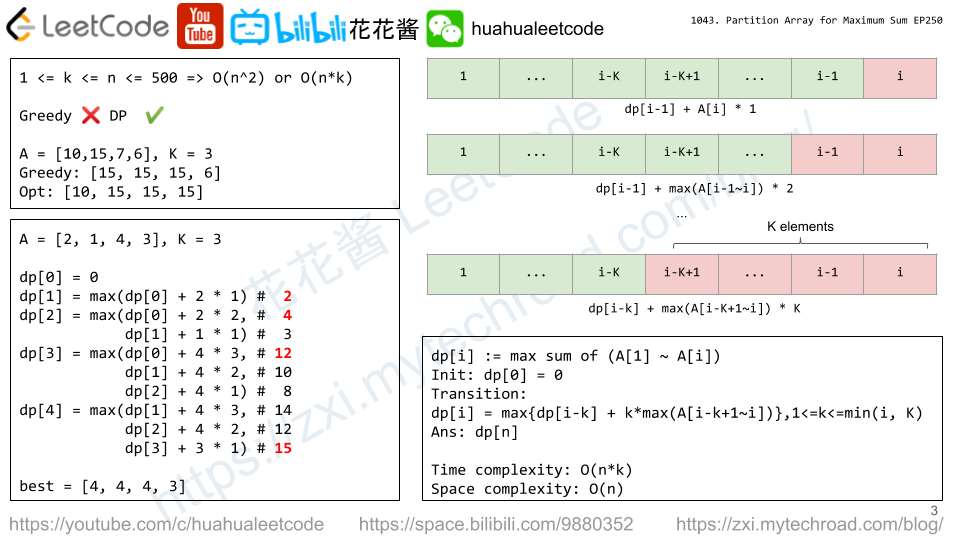Given an integer array A, you partition the array into (contiguous) subarrays of length at most K. After partitioning, each subarray has their values changed to become the maximum value of that subarray.
Return the largest sum of the given array after partitioning.
Example 1:
Input: A = [1,15,7,9,2,5,10], K = 3 Output: 84 Explanation: A becomes [15,15,15,9,10,10,10]
Note:
1 <= K <= A.length <= 5000 <= A[i] <= 10^6
Solution: DP

Time complexity: O(n*k)
Space complexity: O(n)
dp[i] := max sum of A[1] ~ A[i]
init: dp[0] = 0
transition: dp[i] = max{dp[i – k] + max(A[i-k:i]) * k}, 1 <= k <= min(i, K)
ans: dp[n]
A = | 2 | 1 | 4 | 3 | K = 3 dp[0] = 0 dp[1] = max(dp[0] + 2 * 1) = 2 dp[2] = max(dp[0] + 2 * 2, dp[1] + 1 * 1) = max(4, 3) = 4 dp[3] = max(dp[0] + 4 * 3, dp[1] + 4 * 2, dp[2] + 4 * 1) = max(12, 10, 8) = 12 dp[4] = max(dp[1] + 4 * 3, dp[2] + 4 * 2, dp[3] + 3 * 1) = max(14, 12, 15) = 15 best = | 4 | 4 | 4 | 3 |
C++
|
1 2 3 4 5 6 7 8 9 10 11 12 13 14 15 |
class Solution { public: int maxSumAfterPartitioning(vector<int>& A, int K) { int n = A.size(); vector<int> dp(n + 1, 0); for (int i = 1; i <= n; ++i) { int m = INT_MIN; for (int k = 1; k <= K && i - k >= 0; ++k) { m = max(m, A[i - k]); dp[i] = max(dp[i], dp[i - k] + m * k); } } return dp[n]; } }; |
请尊重作者的劳动成果,转载请注明出处!花花保留对文章/视频的所有权利。
如果您喜欢这篇文章/视频,欢迎您捐赠花花。
If you like my articles / videos, donations are welcome.



Be First to Comment